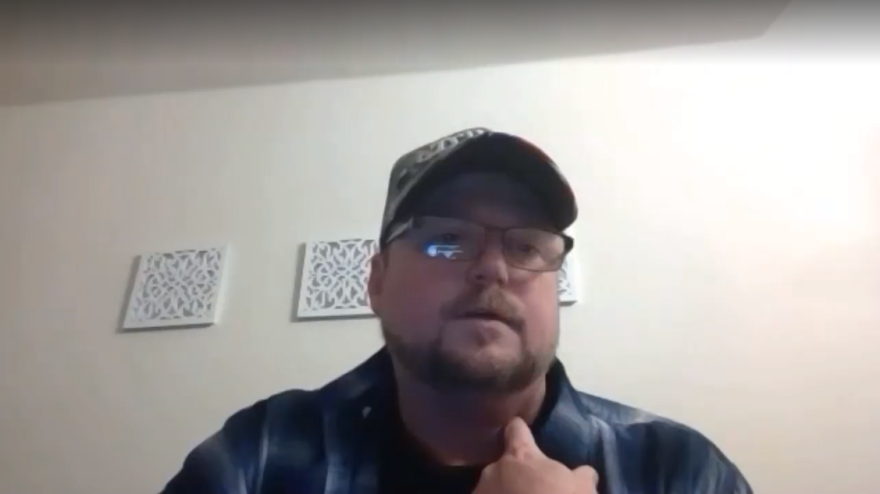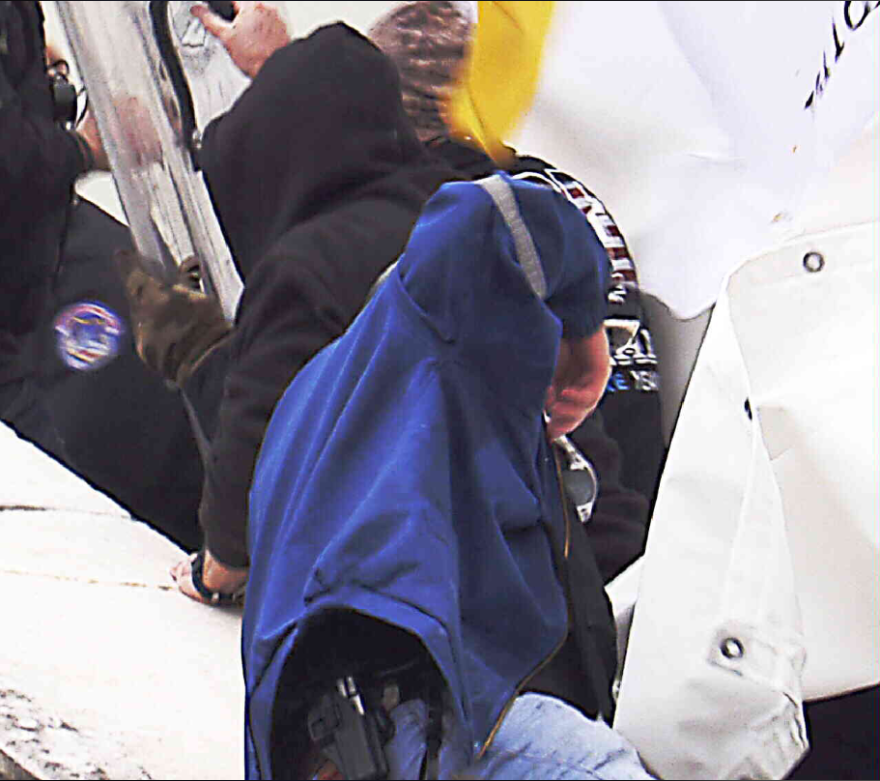Updated at 4:45 p.m. ET
A little more than a year after a group of pro-Trump rioters overwhelmed police, stormed the U.S. Capitol and temporarily halted the country's peaceful transfer of power, a jury has unanimously returned a verdict in the first trial stemming from the events on Jan. 6, 2021:
Guilty on all counts.
The defendant, 49-year-old Guy Wesley Reffitt of Texas, was found guilty of these five criminal charges: transporting a firearm in furtherance of a civil disorder; obstruction of an official proceeding; entering or remaining in a restricted area or grounds with a firearm; obstructing officers during a civil disorder; and obstruction of justice—hindering communication through force or threat of physical force.
It took two days to seat a jury made up of Washington, D.C., residents. Many potential jurors said they lived or worked near the Capitol building — the scene of multiple crimes in this case — or even knew Capitol Police officers who were injured that day, which complicated jury selection. Judge Dabney Friedrich sought jurors who could keep an "open mind," despite anything they had heard before. The jury ultimately included employees of NASA and the Department of Defense, as well as a public school maintenance supervisor.
After opening statements, four days of often emotional testimony and closing arguments in a courthouse located a short walk away from the Capitol, that jury took under four hours to reach its verdict.
Many of the 700-plus defendants charged in connection with the Capitol riot have been closely watching the outcome of this trial as they weigh how to approach their own cases. It is widely believed that this guilty verdict will give prosecutors additional leverage in plea negotiations with other defendants.
When the verdict was read aloud, Reffitt showed little emotion.
At one point during the proceedings, he turned to his wife, Nicole Reffitt, who was sitting in the courtroom. They locked eyes, put their hands on their chests and nodded at one another.
Nicole Reffitt spoke to reporters outside the courthouse soon after. She encouraged other Jan. 6 defendants, whom she referred to as "1/6ers," not to plead guilty.
"Guy was used as an example to make all the 1/6ers take a plea," she said. "Do not take a plea, 1/6ers. Do not."
She said that her husband would appeal the ruling and that "this fight has just begun."
Prosecutors accused Reffitt of traveling to Washington, D.C., with a fellow member of a far-right militia organization called the Texas Three Percenters.
Testimony and evidence showed that Reffitt brought an AR-15 rifle and a pistol with him on the trip. He took that pistol with him to Capitol grounds on Jan. 6, along with zip-tie-style flex cuffs, a helmet and body armor. As demonstrators approached the building, Reffitt started ascending a stairwell in front of the Capitol guarded by a handful of police officers. Those officers testified that Reffitt told them, "You can't stop us all. Let us in. Don't be a traitor." Officers shot at Reffitt with pepper balls and plastic less-lethal rounds and ultimately stopped him with pepper spray. As Reffitt sat on the stairwell, trying to wash the spray from his eyes, video showed him waving rioters forward.
Reffitt did not enter the building himself or make physical contact with any police officers. But Assistant U.S. Attorney Risa Berkower described Reffitt as the "tip of the mob's spear" who gave rioters the window of opportunity to ultimately overwhelm the police line and take over the Capitol building.

When Reffitt returned home to Texas, he bragged in text messages and on recorded Zoom meetings about leading the charge on Jan. 6. His then-18-year-old son, Jackson Reffitt, had liberal political views and was troubled by what his father had done, so he began secretly recording his father. Within days, Guy Reffitt became paranoid about being arrested. Jackson Reffitt testified at the trial that his father told him and his younger teenage sister, "If you turn me in, you're a traitor. And traitors get shot." Jackson Reffitt turned over the recordings he made of his father to the FBI. Five days later, agents arrested Guy Reffitt.
At trial, prosecutors presented what they referred to as a "mountain of evidence." That evidence included text messages; extensive video, including some recorded by Reffitt's helmet-mounted camera on Jan. 6; a recorded Zoom meeting between Reffitt and members of his militia; and the audio recordings made by Jackson Reffitt. Prosecutors backed up that evidence with testimony from Capitol Police officers who tried to stop Reffitt's approach on the building; Rocky Hardie, a former member of the Texas Three Percenters who accompanied Reffitt on the trip to Washington and who was granted immunity for his testimony; and the defendant's son, Jackson Reffitt.

The testimony of son against father made for the most dramatic and emotional day of testimony. Jackson Reffitt described the guilt and discomfort he felt about informing on his dad and how he felt "terrified" when his father told him that "traitors get shot." Jackson Reffitt has been largely estranged from his family since turning his father in to the FBI. At the beginning of his son's testimony, Guy Reffitt began sobbing in the courtroom.
Inspector Monique Moore of the Capitol Police also became emotional when describing the panicked calls for help on the radio from police battling the rioters.
Reffitt's criminal defense attorney, William Welch, called no witnesses, and his cross-examinations of the government's witnesses were generally brief. His opening statement lasted just three minutes.
Welch described the government's prosecution as a "rush to judgment" based on hyperbolic claims from Reffitt that should not be taken seriously. "Guy does brag, he exaggerates and he rants," said Welch. The defense flatly denied that Reffitt had a gun with him on Jan. 6. Prosecutors contradicted that claim with an image of Reffitt on the Capitol steps with a holster holding a shiny object, multiple recorded statements by Reffitt saying he had his handgun on him and testimony from Reffitt's fellow militia member.
At other times, Welch said the prosecution's video evidence could be a "deepfake" — falsified computer-generated footage — or be otherwise manipulated. Welch presented no evidence to support that claim. He also pressed Jackson Reffitt on Guy Reffitt's drinking and use of Xanax, suggesting that Guy Reffitt may have been under the influence when he made the statements heard on recordings. Welch raised the possibility that Jackson Reffitt turned his father in for fame and fortune and asked about the many media interviews Jackson Reffitt has given and the money he has raised on the crowdfunding site GoFundMe. Jackson Reffitt flatly denied Welch's insinuation during his testimony.
In his brief closing argument, Welch again insisted that Guy Reffitt was unarmed and urged the jury to convict Reffitt on a single lesser charge of entering and remaining in a restricted area — a misdemeanor.
The jury appeared to reject all of Welch's arguments and sided with the Department of Justice.
In a statement, the U.S. attorney for the District of Columbia, Matthew M. Graves, said the jury "held Guy Reffitt accountable for his actions on Jan. 6, 2021, finding him guilty of five felony charges. I would like to thank the jury for upholding the rule of law and for its diligent service in this case."
The FBI's Washington Field Office said in a statement: "Rather than take responsibility for his actions at the U.S. Capitol on Jan. 6, 2021, Mr. Reffitt opted to put his family through a painful trial. Today's guilty verdict in the first jury trial of a Jan. 6 defendant should serve as a reminder for others who committed crimes at the Capitol that day that these are serious charges and that the FBI and our law enforcement partners will do what it takes to hold them accountable."
Reffitt's sentencing hearing is set for June 8.
This story has been updated with comments from Guy Reffitt's wife, Nicole Reffitt; the U.S. attorney for the District of Columbia, Matthew M. Graves; and the FBI's Washington Field Office.
Copyright 2022 NPR. To see more, visit https://www.npr.org.


